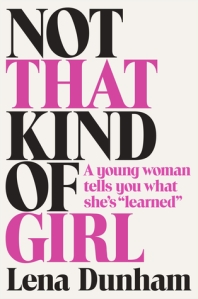 Not that Kind of Girl
Not that Kind of Girl
by Lena Dunham
Random House, 2014
ISBN: 978-0812994995
288 p.p.
In a recent Salon article, Lydia Kiesling wrote of the similarities between the female celebrity memoirs that have come out in the past few years:
There is a pastiche quality to all of these books, but particularly to Fey, Kaling, and Poehler’s–the lists, the childhood photos, the excerpted emails and notes–that hints at a large market forces and the need to make these books all things to all people: people who want funny jokes, people who want to see how the TV sausage gets made, people who want insights into the adolescent yearnings of their pop culture heroes, people who go to Barnes & Noble to buy a latte and cruise the fun-stuff section at the front of the store. It’s a testament to the talents of these women that they can basically succeed at reaching so many types of readers, but it’s also telling that they (and their editors) feel pressure to make these books work on so many levels.
I did not get this feeling reading Kaling’s memoir or Poehler’s, but I did when I read Not that Kind of Girl. Lena Dunham’s thoughts felt abrasive and uncut, which is not unusual for Dunham, but they also felt unfinished. I had the distinct feeling while reading her memoir that Dunham did not even know what she wanted to say. This could be because of how young Dunham is, but she has accomplished so much in her short life that I expected her to have more to say about her experiences. The sections that I was most interested in reading—Dunham’s quick rise to fame and her time on Girls— were barely discussed. She spent much more time discussing her weight, the sex she has had, and her fraught childhood. Maybe these aspects of Dunham’s life would be interesting if she didn’t spend so much time trying to prove that her life was exciting. I was less surprised by the content of her stories and more surprised that Dunham thought these events were worth writing about.
The sections of Not that Kind of Girl that I found most interesting were when Dunham wrote with candor instead of trying to play up the truth. In these essays, Dunham’s tendency to be brazen comes in handy. Her first essay was one of the most interesting to me:
There is nothing gutsier to me than a person announcing that their story is one that deserves to be told, especially if that person is a woman. As hard as we have worked and as far as we have come, there are still so many forces conspiring to tell women that our concerns are petty, our opinions aren’t needed, that we lack the gravitas for our stories to matter. That personal writing by women is no more than an exercise in vanity and that we should appreciate this new world for women, sit down, and shut up.
This excerpt is even more powerful when, much later in the book, Dunham opens up about her rape. She describes the event with a foggy haze, because this is how it is remembered. She was drunk and taken advantage of, and it took her years to realize what actually happened. Dunham does not share this event to get revenge; she even uses a pseudonym for her rapist. She only shares her story because writing about it helped her and because reading it may help other women. In this essay, I felt that Dunham was most connected to her own emotions and feelings. She did not play the story up and make it into something bigger than it was, she just laid it out and let the event speak for itself. It made me wish that she had been this emotionally connected for the rest of the book.
Instead, Dunham fills the book with essays on why she always hated summer camp, how she wished she was a lesbian, and the “crazy” sexual escapades she has had. Some of these essays were enjoyable to read, but most were just boring. I never expected to be bored by Lena Dunham. I do think that Dunham has a story to tell, which is clear when she writes about her relationship with her mother, her rape, and her rise to fame. Dunham’s essay on being ignored as a woman in Hollywood was telling and interesting. So yes, Dunham has a story to tell, but I think she spent too much time trying to convince readers that her life is interesting and not enough time just telling her story. While reading, there were many times where I thought, “I want to hear more about that,” but then Dunham was already on to her next thought. There were a few parts of the book that were compelling and truly powerful, but for the most part, it just felt like Dunham was trying to prove something.
***
 Lena Dunham is an actress, author, screenwriter, director and producer. She is best known for creating, writing, and starring in the HBO series, Girls. Dunham graduated from Oberlin College in 2008 with a degree in creative writing. In 2010, she created and directed Tiny Furniture, which she won the Independent Spirit Award for Best First Screenplay. Dunham has received eight Emmy awards nominations as a director, writer, actress, and producer and won two Golden Globes for Girls. Dunham also won a Director’s Guild Award for Outstanding Director in a Comedy Series for Girls. Dunham lives in New York City.
Lena Dunham is an actress, author, screenwriter, director and producer. She is best known for creating, writing, and starring in the HBO series, Girls. Dunham graduated from Oberlin College in 2008 with a degree in creative writing. In 2010, she created and directed Tiny Furniture, which she won the Independent Spirit Award for Best First Screenplay. Dunham has received eight Emmy awards nominations as a director, writer, actress, and producer and won two Golden Globes for Girls. Dunham also won a Director’s Guild Award for Outstanding Director in a Comedy Series for Girls. Dunham lives in New York City.
